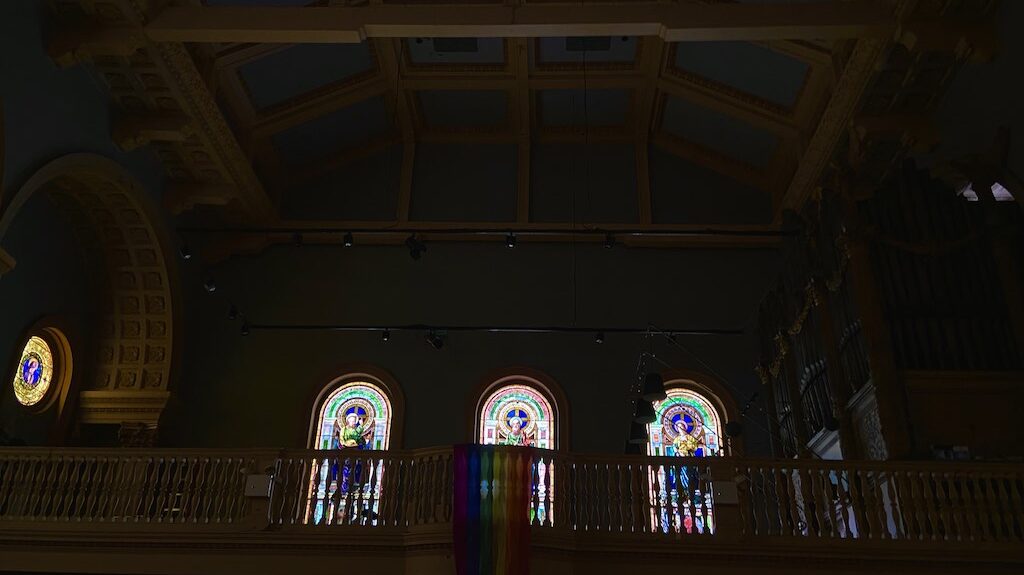Community Featured Articles
One church’s 132 years of justice, arts activism
By Jordan Gay
Pointing to a decades-old fountain on the corner of Washington Square South and Thompson Street, Keen Berger, 80, gives some background on Judson Memorial Church, the congregation she joined 42 years ago.
“That little corner thing that has the spigot, it used to have water,” said Berger, who chairs Judson’s board of trustees. “This used to be, a hundred years ago, a really poor tenement neighborhood, and people did not have running water in their apartments. And Judson provided water for the people.”
Judson Memorial has a legacy of serving others, its members said, and that’s part of its appeal. From being a sanctuary for undocumented immigrants to hosting an underground art gallery that has launched famed careers, the church aims to stand with people, not apart from them. Its activism and community outreach extend back to Judson’s opened in 1893, surrounded by those poor tenement dwellers.
“Our history is long and wonderful,” Berger said. “It’s always been outreach to the community, it’s been a value again and again.”
That outreach to the community includes the church’s arts program. During the 1950s and ‘60s, the Judson Gallery, Judson Dance Theater and Judson Poets’ Theater were acclaimed for showcasing the artistry of many different creatives. The church continues to support artists through almost 30 alliances, including with dance-focused Movement Research and Flux Theatre Ensemble.
“Artists are not supported by our city and by our state and by our federal government, so it’s nice. Artists need space and artists need support and this place gives them that,” said
Matthew Cleaver, 36, who sees Judson’s arts programs as acts of social justice.
Cleaver, a singer, has sung at the Judson, where his husband is a minister and Henco Espag, Judson’s musical director, oversees the church’s choir and other arts-related efforts at the church. It started out as just another job opportunity, because Espag’s previous membership in a much stricter, more dogmatic faith community turned him off of religion for a while. What he witnessed at Judson changed his mind.
Judson member Jon Giles, 59, also felt the church was a good fit. It is, he said, “a community of people who care deeply of what happens outside the walls. So, I came here knowing from its reputation that it was very much a church that was connected to what goes on in the direct community, the greater village, in general.”
That includes places abroad and closer to home. Before Roe v. Wade passed in 1973, said Ted Dawson, 73, a former Judson board chair, the church had operated its Clergy Consultation Service on Abortion in the 1960s and ‘70s, housing women who’d traveled to New York to get an abortion. They called it Judson House, Dawson added. “It was initiated by the minister here to create a nationwide network of religious people who would refer women who needed abortions.”
Today, Judson has a reproductive justice task force; its website provides information on the link between Christian doctrine and the debate over abortion.
The Rev. Julie Johnson Staples, Judson’s interim pastor since last September, said her Aug. 14 sermon will include her reading “A letter to my Black daughter after the fall of Roe” from the Christian Century magazine. “It’s about articulating the thing we believe is right,” Staples said.
Giles supports his church’s reproductive rights efforts. Doing nothing on the issue, he said, “creates an awful lot of dissonance. I mean, for me, just to sit on it is depressing. You have to do something to at least make it just that much more bearable on a personal level.”
Judson Memorial’s activism and community involvement sometimes seems to obscure the fact that Judson is a church, Berger said. She noted that some artists who’ve performed were surprised that a church would give them a stage.
“It’s really our faith that makes us do what we do,” she said.
“We’re not a political group. We’re a church,” Berger added … “that,” interjected Dawson, sitting beside her, “pushes those boundaries.”


